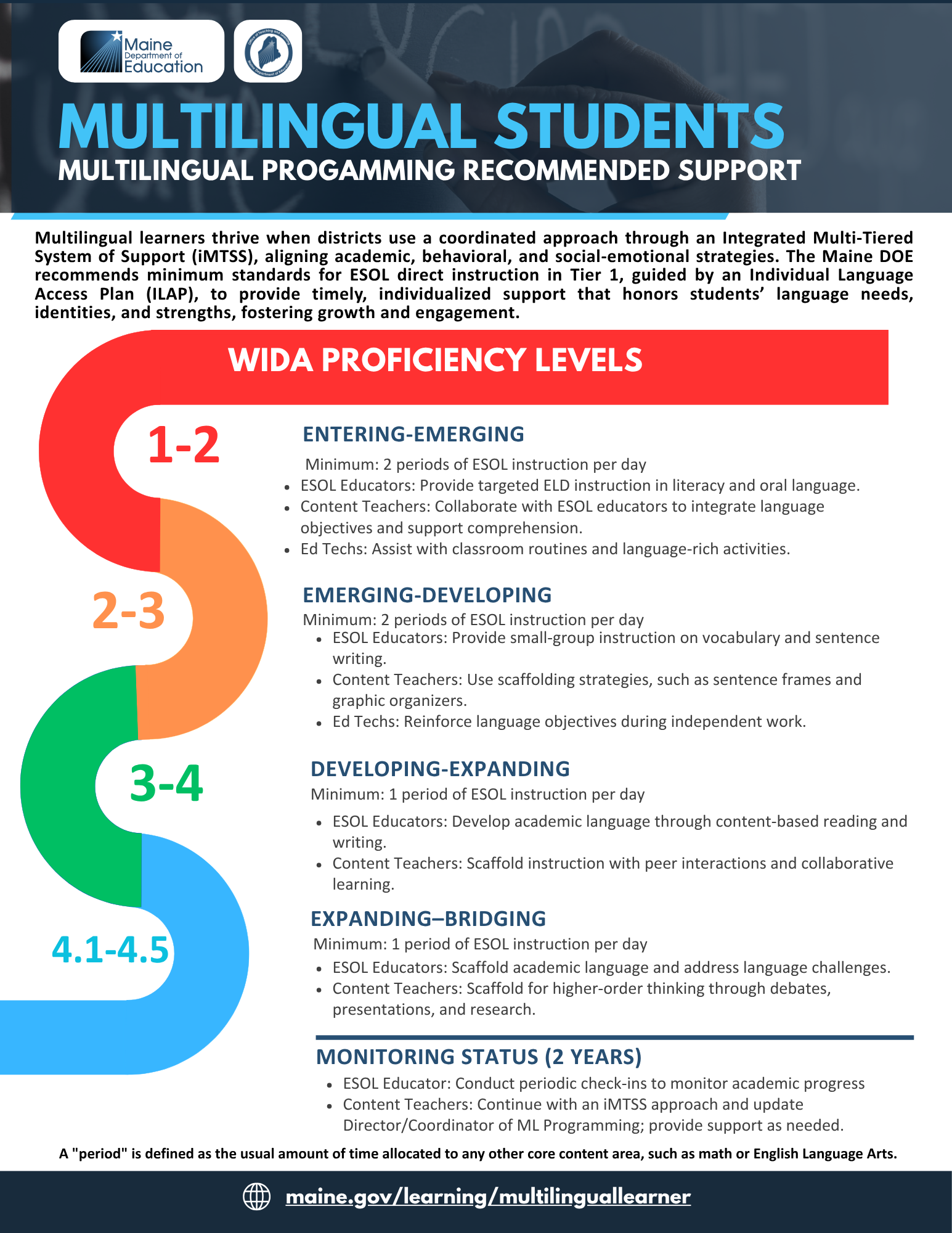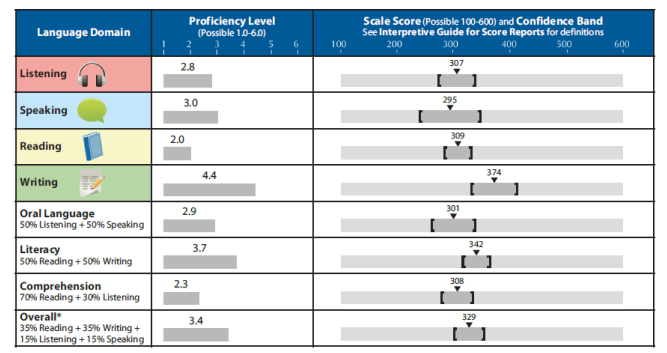Multilingual learners (MLs) thrive when districts implement a transparent, coordinated approach through an Integrated Multi-Tiered System of Support (iMTSS), aligning academic, behavioral, and social-emotional strategies. Guided by an Individual Language Acquisition Plan (ILAP), educators can understand their roles and provide timely, individualized support that honors each student’s language needs, identities, and strengths, fostering growth, engagement, and belonging.
Every school district in Maine is required to designate a certified Director/Coordinator of Multilingual Programs, who has the authority to lead programming across all grade levels. This role is not optional—it is foundational. The Director/Coordinator must oversee key areas such as ML identification, English language development (ELD) instruction, language access, and family engagement, while ensuring compliance with federal civil rights law (34 C.F.R. §100.3(b)(2)) and state requirements.
To ensure ML students receive meaningful instruction, ELD services must be delivered or directly overseen by certified ESOL (660) educators. Staffing decisions must be based on student need and WIDA proficiency levels, not convenience, scheduling conflicts, or availability of uncertified staff.

Roles and Responsibilities
Download the shareable Roles and Responsibilities
District/Coordinator of Multilingual Programs
- Every SAU designates a Director or Coordinator of ML Programming to guide identification, instruction, and family engagement across all grade levels.
- Oversee the development and implementation of the district's ML programs.
- Ensure compliance with federal and state laws regarding multilingual education.
- Coordinate professional development for educators on effective strategies for teaching MLs.
- Monitor and evaluate the effectiveness of ML programs, making data-driven adjustments as needed.
ESOL Educator (660 Certification)
- Develop and implement Individualized Language Acquisition Plans (ILAPs) for MLs.
- Provide direct English language development (ELD) instruction aligned with WIDA standards.
- Collaborate with content educators to integrate language objectives into lesson plans.
- Analyze language proficiency assessments to monitor student progress.
- Participate in professional development opportunities to stay current with best practices in multilingual education.
- ESOL Program Support
Educators and School staff
Including grade-level teachers, content teachers, and Special Education teachers
-
Collaborate with ESOL specialists to adapt the curriculum for multilingual learners.
-
Integrate language objectives with content objectives and IEP goals, if applicable, in lesson planning.
-
Use scaffolding techniques to support language development.
-
Monitor and assess academic progress.
Educational Technicians
- Assist with language development activities under the educator's guidance.
- Support multilingual learners in accessing materials and resources.
- Facilitate small group or individual language support.
- Cannot provide direct instruction
 What is an Individual Language Acquisition Plan?
What is an Individual Language Acquisition Plan?
An Individual Language Acquisition Plan (ILAP) is a required, personalized plan that outlines each multilingual learner’s language-development needs. Developed by the students’ ESOL teacher and team and updated annually, the ILAP is shared with students, families, and staff who support them. It provides clear guidance on the student’s English proficiency levels, language goals aligned with Maine’s English Language Development (ELD) Standards, and recommended linguistic scaffolds for classroom instruction and assessments.
Access resources to learn how to develop effective ILAPs for multilingual learners, with collaboration and instructional planning in mind.
- ILAP Series Session 1 - Video | Presentation
- ILAP Series Session 2 - Video | Presentation
- ILAP Series Resource Document
Supporting Multilingual Learners through WIDA Proficiency Levels within an Integrated Multi-Tiered System of Supports (IMTSS)
Effective support for multilingual learners requires a deliberate alignment of instructional practices with students’ current English language proficiency levels. Guided by the WIDA English Language Development Standards, educators assess and respond to students’ language abilities to ensure that instruction is both accessible and rigorous. Within an IMTSS, this alignment allows for differentiated and targeted interventions across all tiers of support. By systematically integrating language development goals into the academic and behavioral frameworks of the IMTSS, schools can provide equitable access to instruction, promote sustained academic achievement, and support comprehensive, inclusive language acquisition for multilingual learners.

- Elementary (Prek-5)
-
WIDA Proficiency Levels 1-2 (Entering-Emerging)-Minimum: 2 periods of ESOL instruction per day
- ESOL Educator: Provide daily targeted English language development (ELD) instruction focusing on foundational literacy and oral language skills.
- Content Teachers: Collaborate with ESOL educators to incorporate language objectives into lessons and use visual aids and hands-on activities to support comprehension.
- Educational Technicians: Assist with classroom routines and provide additional support during language-rich activities
WIDA Proficiency Levels 2-3-(Emerging-Developing)-Minimum: 2 periods of ESOL instruction per day
- ESOL Educator: Offer small-group instruction emphasizing vocabulary development and sentence-level writing.
- Content Teachers: Implement scaffolding strategies such as sentence frames and graphic organizers to support content understanding.
- Instructional Aides: Support students during independent work and reinforce language objectives introduced by teachers.
WIDA Proficiency Levels 3-4 (Developing-Expanding)-Minimum: 1 period of ESOL instruction per day
- ESOL Educator: Focus on academic language development through reading and writing activities connected to content areas.
- Content Teachers: Differentiate instruction by providing opportunities for structured peer interactions and collaborative learning.
WIDA Proficiency Levels 4.1–4.5 (Expanding–Bridging)-Minimum: 1 period of ESOL instruction per day
- ESOL Educator: Provide support as needed, focusing on refining academic language and addressing specific language challenges.
- Content Teachers: Encourage higher-order thinking and extended discourse through debates, presentations, and research projects.
Monitoring Status (2 years)
- ESOL Educator: Conduct periodic check-ins to monitor academic progress
- Content Teachers: Continue with an iMTSS approach and update Director/Coordinator of ML Programming; provide support as needed.
A "period" is defined as the usual amount of time allocated to any other core content area, such as math or English Language Arts. This recommendation ensures that MLs receive sufficient, evidence-based services from appropriately qualified staff, aligning with their civil rights to meaningful access to education.
- Middle School (6-8)
-
WIDA Proficiency Levels 1-2 (Entering-Emerging) Minimum: 2 periods of ESOL instruction per day
- ESOL Educator: Deliver intensive ELD instruction focusing on functional everyday language and basic academic vocabulary
- Content Teachers: Simplify language without diluting content, and use visuals and realia to aid understanding.
- Ed Techs: Support students during transitions and reinforce language learned in ESOL sessions.
WIDA Proficiency Levels 2-3 (Emerging-Developing: Minimum: 2 periods of ESOL instruction per day
- ESOL Educator: Focus on teaching language structures and functions through meaningful, content-based activities that help students understand and use English in real classroom contexts.
- Content Teachers: Incorporate cooperative learning strategies and scaffolded assignments.
- Ed Techs: Assist with note-taking and organization to support language acquisition.
WIDA Proficiency Levels 3-4 (Developing-Expanding): Minimum: 1 period of ESOL instruction per day
- ESOL Educator: Focus on refining language skills through content-based instruction.
- Content Teachers: Provide opportunities for extended writing and oral presentations.
WIDA Proficiency Levels 4.1–4.5 (Expanding–Bridging): Minimum: 1 period of ESOL instruction per day
- ESOL Educator: Provide targeted support for advanced language structures and academic discourse.
- Content Teachers: Encourage critical thinking and analysis through complex texts and discussions.
Monitoring Status (2 years)
- ESOL Educator: Track academic performance and provide interventions if necessary.
- Content Teachers: Maintain high expectations and continue to support language development.
A "period" is defined as the usual amount of time allocated to any other core content area, such as math or English Language Arts. This recommendation ensures that MLs receive sufficient, evidence-based services from appropriately qualified staff, aligning with their civil rights to meaningful access to education.
- High School
-
WIDA Proficiency Levels 1-2 (Entering-Emerging) Minimum: 2 periods of ESOL instruction per day
- ESOL Educator: Deliver intensive ELD instruction focusing on functional everyday language and basic academic vocabulary
- Content Teachers: Simplify language without diluting content, and use visuals and realia to aid understanding.
- Ed Techs: Support students during transitions and reinforce language learned in ESOL sessions.
WIDA Proficiency Levels 2-3 (Emerging-Developing: Minimum: 2 periods of ESOL instruction per day
- ESOL Educator: Focus on teaching language structures and functions through meaningful, content-based activities that help students understand and use English in real classroom contexts.
- Content Teachers: Incorporate cooperative learning strategies and scaffolded assignments.
- Ed Techs: Assist with note-taking and organization to support language acquisition.
WIDA Proficiency Levels 3-4 (Developing-Expanding): Minimum: 1 period of ESOL instruction per day
- ESOL Educator: Focus on refining language skills through content-based instruction.
- Content Teachers: Provide opportunities for extended writing and oral presentations.
WIDA Proficiency Levels Levels 4.1–4.5 (Expanding–Bridging): Minimum: 1 period of ESOL instruction per day
- ESOL Educator: Provide targeted support for advanced language structures and academic discourse.
- Content Teachers: Encourage critical thinking and analysis through complex texts and discussions.
Monitoring Status (2 years)
- ESOL Educator: Track academic performance and provide interventions if necessary.
- Content Teachers: Maintain high expectations and continue to support language development.
A "period" is defined as the usual amount of time allocated to any other core content area, such as math or English Language Arts. This recommendation ensures that MLs receive sufficient, evidence-based services from appropriately qualified staff, aligning with their civil rights to meaningful access to education.
The Maine Department of Education recently received clarification from the United States Department of Education Office for Civil Rights (OCR) regarding the provision of English language acquisition services to students who are multilingual learners (MLs). We recognize that the guidance we have received may have financial and programmatic implications for School Administrative Units (SAUs), and encourage SAUs to carefully review existing Lau Plans, and revise accordingly. See Maine DOE Lau Plan Template and Guidance for assistance.
The following key clarifications were provided by OCR:
1. The “consultation model” of services is not considered to be based on sound educational theory and should not be used.
Through the “consultation model,” students who are MLs receive no direct services from a teacher qualified in English for speakers of other languages (ESOL). Instead, students spend the entirety of their academic day in the mainstream with teachers without ESOL qualifications, and an ESOL-endorsed teacher (or other professional learning provider) gives some training to the mainstream teachers through consultation. OCR advises that this service model may violate students’ civil rights, given that it provides neither sufficient, evidence-based services nor appropriately qualified staff to implement the ESOL program.
2. MLs in English language proficiency levels one and two (as measured by WIDA assessments) should receive at least two periods of ESOL per day, and MLs above proficiency level two should receive at least one period of ESOL per day.
OCR recommends that schools adopt this minimum guideline for services for students who are MLs. A period is defined as the usual amount of time dedicated to any other content area, such as math or English language arts (ELA). In the case of block scheduling, a student who is an ML may have ESOL services every other day, similar to other content areas.
Note that ELA or other content area periods may serve as ESOL periods for students in level 4.0 or higher only if the teacher is ESOL-endorsed and/or the course is co-taught with an ESOL-endorsed teacher. Co-teaching is a structured system of co-planning, co-instruction, co-assessment, and reflection; co-teaching is not synonymous with push-in services.
3. Ed Techs, tutors, or other educators cannot provide the core ESOL services required by civil rights law, even under supervision of an ESOL-endorsed teacher.
As stated in the DOE/DOJ Dear Colleague Letter from January 7, 2015, Ed Techs may provide supplemental services only, which go above and beyond the core services that are provided by an ESOL-endorsed teacher. Additionally, the Letter states that “Paraprofessionals, aides, or tutors may not take the place of qualified teachers and may be used only as an interim measure while the school district hires, trains, or otherwise secures enough qualified teachers to serve its EL students.”
4. ESOL services can be declined by parents/guardians only with meaningful consent.
Schools are advised to have programs in place that reflect the three clarifications shared above. OCR recommends that schools encourage parents/guardians of students who are MLs to enroll their children in the ESOL program. However, if parents/guardians elect to decline ESOL services altogether, or a particular type of service (such as pull-out), schools must first ensure that parents/guardians fully understand their children’s rights and options, as well as the educational implications of declining ESOL services. Even when parents/guardians decline ESOL services, schools continue to be responsible for meeting students’ academic and language learning needs.
A Follow Up FAQ Document for Priority Notice Regarding English Language Acquisition Service Provision and Staffing Guidance
In an effort to ensure clarity for school and SAU leaders, we have developed a list of frequently asked questions in response to recent guidance on ESOL services and staffing. As always, if we can further clarify or provide assistance, please contact the ESOL specialist.
1. Is this Priority Notice a mandate?
Maine does not currently have legislation to mandate specific English for Speakers of Other Languages (ESOL) service provision parameters. The Priority Notice serves as guidance to districts to help them plan appropriately for their ESOL programs. The information contained in the notice is based on Title VI of the Civil Rights Act and its interpretation by the United States Department of Education’s Office for Civil Rights (OCR) and the Department of Justice (DOJ), which are the two agencies that are charged with investigating civil rights violations.
2. Will the Maine DOE be monitoring districts to enforce implementation of these guidelines?
The Maine Department of Education (DOE) serves as a resource, supporting schools in implementing best practices in ESOL. We do not have a role in civil rights compliance. Parents/guardians and other community members with concerns about suspected civil rights violations may file complaints with OCR, and an investigation would then be conducted by OCR.
3. Does the guidance regarding the “consultation model” mean that districts cannot contract with ESOL teachers, and must hire them as staff members?
Districts may still contract with teachers. However, regardless of whether an ESOL teacher is contracted or hired, the ESOL 660-endorsed teacher should be the person providing direct support to students, rather than educators who are not 660-endorsed.
4. Since an Ed Tech may only provide supplemental services to MLs, above and beyond the core services required by civil rights law, what types of services would be considered supplemental?
If a student who is an ML receives the recommended 1-2 periods of ESOL support per day from an ESOL-endorsed teacher, an Ed Tech may, for example:
- push into content area classes
- provide homework help during study hall or before/after school
- assist the student with developing skills in the student’s primary/home language
5. How can districts implement this guidance, in light of the ESOL teacher shortage?
The Maine DOE recognizes the challenges districts face to find ESOL-endorsed teachers, and we are currently exploring ways to help increase the number of ESOL teachers across the state. Meanwhile, using approaches such as co-teaching, supporting existing staff to pursue ESOL endorsement, creating regional partnerships between districts, and considering options such as online ESOL services may help to implement the service provision guidelines.
6. If a district feels that its current ESOL program is working, why is the Maine DOE recommending changing it?
The recommendations in the Priority Notice are based on direct guidance provided to the Maine DOE by the OCR, as well as an extensive list of settlement agreements between the DOJ and many school districts across the country whose ESOL services have not met the minimum expectations.
7. What is the expected timeline for implementation of these guidelines?
The Maine DOE has not established a recommended timeline, as each district will need to formulate its own individualized plan. In the event of an OCR or DOJ investigation, a case resolution or settlement agreement would include a specific timeline for the necessary changes to be made.
8. How can districts increase the capacity of current classroom teachers to meet the needs of students who are MLs?
There are many opportunities for professional learning on ESOL provided through the Maine DOE. The University of Maine at Farmington and the University of Southern Maine also offer courses on ESOL, including online courses for certified teachers to become ESOL endorsed.
Contact
Jane Armstrong
ESOL State Specialist
Email: Jane.Armstrong@maine.gov